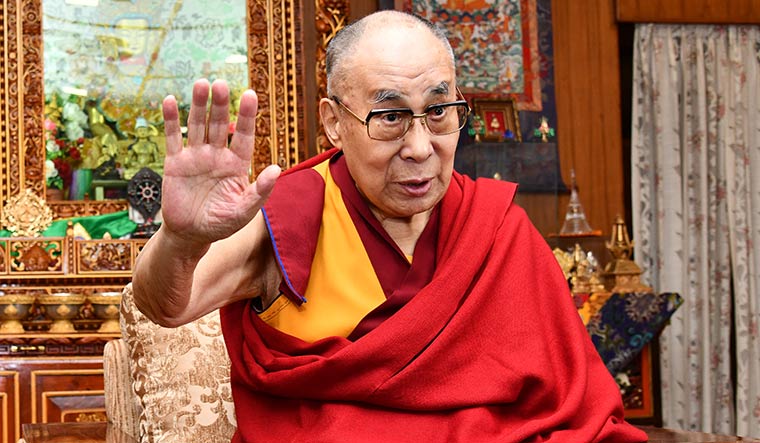China has begun laying the groundwork for the proposed visit of president Xi Jinping to India later this year, by making it clear that New Delhi must cooperate with Beijing on the contentious issue of recognition of the 15th Dalai Lama.
Uneasy over what the 84-year-old Lama might do as far as his reincarnation is concerned, Chinese authorities have said that any refusal by India to recognise the next Dalai Lama will impact bilateral ties.
The 14th Dalai Lama, who has been living in India since he fled Tibet in 1959, had said in an interview to THE WEEK on July 4 that the practice of reincarnation of the Dalai Lama in Tibet, which continues to be under Chinese control, is a feudal system and may not be the only way to recognise his successor.
ALSO READ
- OPINION: Buddhism as soft power and the gift of the Dalai Lama’s presence
- OPINION: Campaign against Dalai Lama has deeply hurt Tibetans' sentiments
- 'Often teases people': Dalai Lama issues apology to boy, his family after kissing video goes viral
- China's efforts to destroy Buddhism won't succeed: Dalai Lama
- Tailing Dalai Lama, Chinese 'spy' visited Delhi, Bodhgaya; got stuck in Dharamshala amid pandemic
- Chinese woman detained in Bihar's Gaya on suspicion of spying on Dalai Lama
But, senior Chinese officials and experts have taken strong objection to his statements and said that the reincarnation of the Dalai Lama must be approved by the Chinese government and the selection should take place within the country, based on a 200-year-old historical process.
“The reincarnation of the Dalai Lama is a historical, religious and political issue. There are established historical institutions and formalities for the reincarnation of the Dalai Lama,” said Wang Neng Sheng, director general at the government of Tibet Autonomous Region.
“The Dalai Lama’s reincarnation is not decided by his personal wish or by some group of people living in other countries,” he added.
Zha Luo, director at Beijing-based China Tibetology Research Centre, a government-run influential think tank, said any refusal by India to recognise the next Dalai Lama to be chosen within China will impact bilateral ties.
But, the Dalai Lama, who also calls himself a “son of India”, has thrown the doors open to choosing his successor according to the wishes of the people of Tibet.
In such a scenario, if the Tibetan people ask the Dalai Lama to choose his successor, it could spell trouble for China as the successor could well be from India and, even if not, he would be of the choosing of Dalai Lama whom the Chinese call a separatist.
In the interview, the Dalai Lama raised questions about the reincarnation system in Tibet. “If reincarnation was so important, then why did the Buddha not have a reincarnation? All these Nalanda masters should have reincarnated. However, [there being no reincarnations of the masters] even after thousands of years, their teachings are still relevant. So we should give more importance to the teachings. Sometimes, I also feel the Lama institution has some connection to the feudal system and isn't relevant today.”
The Dalai Lama further said that the choosing of his successor is “up to the will of the people”.
“Tomorrow, if one child expresses convincingly about past life, then people may realise that this is a reincarnation of a particular person, but there is no certain institution for it. If you investigate, there are some Lamas who are not properly qualified, but they take the name of the higher Lama. Since the reincarnation system started in Tibet, there have been many good reincarnated Lamas who served the Buddha dharma, but sometimes, there have also been cases where someone recognised as a reincarnation turned out to be a disgrace, which is very sad.”
The Dalai Lama not only left the choice of his successor on the people of Tibet, but also pointed out that the reality of China is changing. “From being a socialist country, China's reality is very different today. Once, when I met Israel's president Shimon Peres, a Nobel laureate and a staunch socialist, he expressed a strong sympathetic feeling towards China and in some cases was even ready to defend it. After several years, I met him in Jordan in 2009. Later, I asked him whether he still thought of China as a socialist country. He said that it is no longer a socialist country and suffers from the worst kind of capitalism,” said the Dalai Lama.
Dalai Lama's comments on China and the reincarnation system seem to have irked Beijing. An official in Chinese government told THE WEEK that the issue is not between China and the Tibetans in exile, but between China and Dalai Lama which means that Beijing will not appreciate New Delhi's interference in the matter by either giving too much credence to Dalai Lama or the discussions around who will be his successor.
Sources said the meeting between Modi and Xi Jinping is likely to take place in October and on the table are discussions to find ways to strengthen bilateral ties. The buzzword is cooperation and the message seems to have only gone down too well with New Delhi which has begun preparations to host Xi Jinping months after the Modi government returned to power with a thumping majority.
Incidentally, the Dalai Lama's 84th birthday was celebrated by the Tibetan community in New Delhi and Dharamsala on July 6. What was different this time was that there was thin representation from the Indian side and no presence of the ministry of external affairs. The fact that the government did not wish to send any wrong message to Beijing ahead of Xi's visit has already become amply clear.



